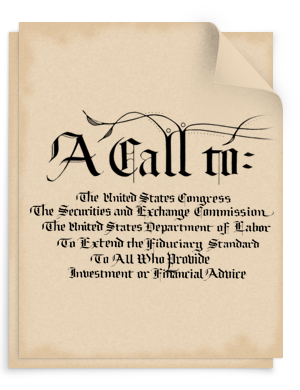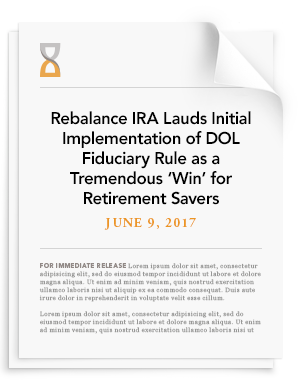This New Rule Will Upend Your 401(k), IRA And Your Relationship With Your Advisor

How can you be sure your financial advisor is acting in your best interest? Our firm’s Scott Puritz details to Darla Mercado at CNBC a sure-fire way to find out.
Dramatic changes for your retirement savings are coming, and your relationship with your financial advisor is due for a shift
The new “fiduciary rule” went into effect Friday. The regulation will require your financial advisor to act in your best interest when advising over your 401(k) and individual retirement accounts.
This hotly debated rule was originally slated for an April 10 debut, but the Labor Department delayed its start date by 60 days after President Donald Trump drafted a presidential memorandum in February. In it, he told the federal agency to review the rule and prepare an updated economic and legal analysis.
Changes are also coming for your relationship with your financial advisor, particularly if you roll over your 401(k) savings with him or her, and you may wind up paying higher fees as a result.
“Many advisors have taken the position that they can advise on your 401(k), but to do it well, they need to understand your other income sources and your family situation,” said Marcia Wagner, managing director of the Wagner Law Group in Boston.
“I see more use of full-scale financial planning,” she said. “It’s a way to demonstrate best interest and to look at things more holistically.”
Here’s how your advisor’s services may evolve post-fiduciary rule.
Conflicts of interest
As of Friday June 9th, your financial advisor and his or her firm will need to comply with the “impartial conduct standard.”
This means financial advisors must charge no more than reasonable compensation, avoid misleading statements and, perhaps most importantly, provide advice that is in the best interest of the investor.
Between June 9 and January 1, 2018, the Labor Department will apply a temporary enforcement policy, under which it will not pursue claims against fiduciaries who are working in good faith to follow the rule.
“In order to demonstrate compliance with the standard under the new rule, advisors will have to develop a paper trail,” said Duane Thompson, senior policy analyst at Fi360, a fiduciary consultancy.
“For rollover advice, advisors need to show a comparative analysis between the costs and services offered in [an] IRA and the 401(k) in order to stay out of trouble,” he said.
Bear in mind that IRA rollovers out of retirement plans have been a gold mine for advisors and their firms.
Investors may have a wider array of investments in an IRA compared with what they had in a 401(k), but they may also be subject to higher costs, including the fee an advisor will charge.
Emphasis on financial planning
An advisor who moves a client from a low-cost 401(k) to a more expensive IRA will need to justify his fees, Thompson said.
As an investor, you may see your advisor do this by providing you with enhanced service, including customized financial planning and income distribution planning.
“More advisors have flat fees as part of their structure as they place more emphasis on service above and beyond the investment process,” said Rob Cirrotti, head of retirement and investment solutions at Pershing LLC. “That gets back to the financial planning process.”
Some of that additional advice might include planning out your income stream, customizing your investment selection and devising a strategy for the required minimum distributions you must take from your retirement accounts after age 70½.
Be discerning
The fiduciary rule is taking effect, but at the end of the day you’re your own best advocate — especially when you’re looking for the right advisor.
Be prepared to compare costs and services.
“The investor has a higher awareness of the fiduciary standard, but it doesn’t mean you should implicitly trust your advisor,” said Thompson. “You still need to ask questions.”
Are you a fiduciary? Find out immediately if your advisor is acting in your best interest. Get the point across with this fiduciary oath from the Committee for the Fiduciary Standard. It’s best to ask this question in writing.
“If you deliver the questions orally, you get a wishy-washy answer,” said Scott Puritz, Managing Director of Rebalance. “Send an email and request that the answer come back in writing.”
How are you paid for your services? Ask whether you’re paying a fee for your advisor’s help, be it hourly, as part of a subscription or based on assets he or she manages for you. Find out whether your advisor receives a commission for the sale of mutual funds, insurance and annuities.
Where do you keep your assets? Some large broker-dealer firms will hold your assets in custody because you have a brokerage account with them. If you’re using an independent fee-only advisor, he or she will likely hold your assets at a custodian, such as TD Ameritrade, Charles Schwab or Fidelity.
“Don’t let your advisor take your money and move it to their account,” said David J. O’Brien, principal at Evolution Advisers in Midlothian, Virginia. Be sure to match the statements you get from your custodian and the statements your advisor provides you.
What are your qualifications? There’s an alphabet soup of different designations for financial advisors, but keep an eye out for the best-known credentials: certified financial planner, chartered financial analyst and certified public accountant. Though each of these designations correspond to different specialties, all three require study and practical experience.






